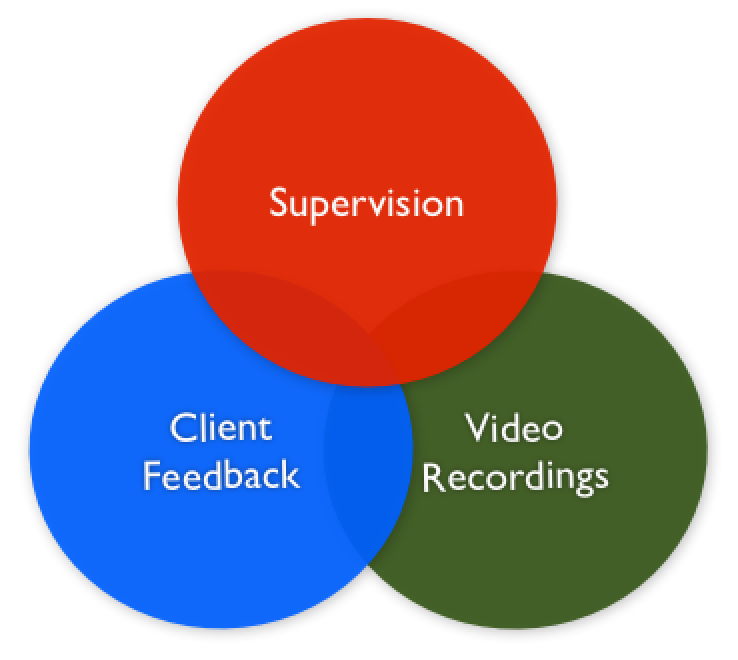It seems that we share more in common with Homer Simpson than we like to admit. Did you know that social psychologists found that in general, people rate themselves as more attractive that they really are?(1)
 In my doctoral study of highly effective psychotherapists(2), the results of an area investigated about therapists self-ratings of their Healing Involvement (HI) in therapy left us initially scratching our heads. Orlinsky and Ronnstead(3) describes someone with high HI as someone who views themselves as personally invested, efficacious in relating with the client, affirming, and highly skilling, experiencing flow states in therapy, and employ constructive coping strategies. What we found was a negative relationship between their outcomes performance and HI rating. In other words, therapists who rated high on their HI scores were more likely to be less effective than their peers! How is this possible? Going further, the same group of therapists we studied, half of them rated their current effectiveness as above average. None rated below average. What’s more, these self-assessment of effectiveness ratings did not predictor their actual client outcomes.
In my doctoral study of highly effective psychotherapists(2), the results of an area investigated about therapists self-ratings of their Healing Involvement (HI) in therapy left us initially scratching our heads. Orlinsky and Ronnstead(3) describes someone with high HI as someone who views themselves as personally invested, efficacious in relating with the client, affirming, and highly skilling, experiencing flow states in therapy, and employ constructive coping strategies. What we found was a negative relationship between their outcomes performance and HI rating. In other words, therapists who rated high on their HI scores were more likely to be less effective than their peers! How is this possible? Going further, the same group of therapists we studied, half of them rated their current effectiveness as above average. None rated below average. What’s more, these self-assessment of effectiveness ratings did not predictor their actual client outcomes.
Why do therapists with higher self-perception of healing involvement (HI) in their work are more likely to be performing poorer than their peers with low HI self-ratings? We can speculate a few explanations:
1. The illusion of validity:
Ask any couple who lives together, what is the percentage of house chores that each of them does, it will add up to be beyond 100%. The first psychologist recipient of a nobel prize, Dr. Daniel Kahneman, termed this self-assessment bias as “the illusion of validity.”(4) He describes this as the fallacy of our judgments about our own abilities, especially without any feedback from external sources to confirm or disconfirm our intuitive responses. Beyond household chores, this pitfall is likely to be caused by a self-optimistic bias about an expert’s ability to forecast events and make decisions. For example, Dr. Kahneman found that experts making political judgments, stock traders, and financial advisors were not only inaccurate in their predictions, but also overly-confident in their judgments. Similar self-assessment biases have also been found with physicians.(5)
In our work as therapists, a healthy dose of optimism may keep us going. But leaving it only to our intuition, inflated confidence without other sources of confirmation, can be a slippery slope.
2. The more effective bunch are more critical of their work:
Past psychotherapy research suggests some possibilities. Hailing from the Vanderbilt psychotherapy research group, Najavits and Strupp(6) found that effective therapists are more self-critical and reported making more mistakes then less effective therapists. In a recent study, therapist who reported being plagued by about their expertise, termed as professional self-doubt (PSD), had a positive effect on client ratings of working alliance. In other words, higher levels of PSD suggests an open attitude towards admitting their own shortcomings.(7) Taken together, this seems to suggest a willingness on more effective therapists’ part to evaluate their contribution to the psychotherapeutic process, as well as possibly working on ways to self-correct and improve on their performance.
As it seems, those who think they are novices think more like experts, and those who think they are experts are actually more like novices.
Here’s How:
What are we to do to avoid the “illusion of validity”? Given that we therapists are typically an optimistic bunch, we need some pillars in place to prevent us from falling prey to an expert’s “I-know-it-all” mindset. This calls for adopting scaffold in your practice. Allow me to explain the “3-Dimensional Perspective” that can benefit your professional development and your client:
1. Elicit client’s formal feedback:
Whatever measures you choose, be it the Outcome Rating Scale & Session Rating Scale (ORS/SRS), Outcome Questionnaire (OQ-45), or the Clinical Outcome Routine Evaluation (CORE), employ it consistently in your clinical practice. Past studies indicate that routine outcome monitoring is likely to as much as double your effectiveness and reduce deterioration rates. In all, feedback effects contribute around 5-10% of the improvements in therapy.7 (Recall that specific treatment models contribute a tiny erm, 0-1% of the outcome).
2. Video-record your sessions:
Experienced therapists are more likely to say that this activity is something you do only when you are in school. Do you see the “illusion of validity” creeping in here?
Among other approaches, the folks from the intensive short-term dynamic psychotherapy (ISTDP) advocate for the recording of sessions, and using them to review during clinical supervision and self-supervision. I used to audio record all my sessions, but since getting the opportunity to learn more with Tony Rousmaniere, a trainer from ISTDP (as well as ICCE), as well as reading Jon Fredericton’s excellent book Co-Creating Change (2013), I’ve now stuck my video recording devices in my clinical practice. Clients know that my main purpose is to make I deliver to them the best of my ability, and the video recording is one way for me to do that.
3. Supervision/Coach/Mentor:
It is essential to have someone to not only provide case consultations, but also a supervisor who can help you design an individualised learning and development plan.
I highly recommend for supervisees to arm themselves with two things when you go for supervision: bring your session-by-session outcome graphs and your session audio-video recordings. Put deteriorating or no-progress cases as a priority, and view segments of the recording together. Talk to your supervisor about this practice, if he or she isn’t familiar with it. Get on to the International Center for Clinical Excellence (ICCE) website for free resources on this, or even purchase the FIT manuals (one of the ebooks is clinical supervision). The primary aim of this is to bring your client’s perspective into the conversation in supervision, and not let it slip into either a “pad on the back” episode or a gossip session. Stay close to the music of therapy, and not just talk about it.
Now, clinical supervisors might be helpful for case discussions, but if your supervisor does help you reach beyond your “growth edge”, i.e., develop and tailored learning plan, seek out a mentor as well. This is someone who can point you in a right direction, to move you beyond your comfort zone. It can be a colleague whose work you admire, or you can seek them out across the globe. Video conferencing technologies have made this much easier.
Each of the three practice activities described above, compliment each other. The third activity, of seeking a clinical supervisor/coach/mentor is likely what most of you already are doing. I also highly recommend this for the highly experienced therapists. If our clients are to experience growth and change, we first need to continuously experience this ourselves. It is likely that the first two, Elicit Clients’ Formal Feedback, and Video-Record Your Sessions, are the most difficult to kick-start. As with most behavioral change, start measurably small. If you are new to all of this, print out the outcome measure you want to adopt using (The outcome rating scale/session rating scales are free-to-use). Seek out others who are doing so already. Ask a question in the ICCE forum.
(Stay tuned. I will be elaborating on each of the three points above in future posts)
Stick-It:
Consider the above “3-Dimensional Perspective” to enhance your craft.
References:
1. Epley, N. and Whitchurch, E. (2008). Mirror, mirror, on the way: Enhancement in self-recognition. Personality and Social Psychology Bulletin 349:1159-70.
2. Chow, D. (2014). The study of supershrinks: Development and deliberate practices of highly effective psychotherapists. (PhD), Curtin University, Australia.
3. Orlinsky, D. E., & Ronnestad, M. H. (2005). How psychotherapists develop: A study of therapeutic work and professional growth. Washington: American Psychological Association.
4. Kahneman, D. (2011). Thinking, fast and slow. New York, NY: Farrar, Straus and Giroux; US.
5. Davis, D. A., Mazmanian, P. E., Fordis, M., Van Harrison, R., Thorpe, K. E., & Perrier, L. (2006). Accuracy of physician self-assessment compared with observed measures of competence: A systematic review. JAMA, 296(9), 1094-1102. doi:10.1001/jama.296.9.1094
6. Najavits, L. M., & Strupp, H. H. (1994). Differences in the effectiveness of psychodynamic therapists: A process-outcome study. Psychotherapy: Theory, Research, Practice, Training, 31(1), 114-123 6. Najavits, L. M., & Strupp, H. H. (1994). Differences in the effectiveness of psychodynamic therapists: A process-outcome study. Psychotherapy: Theory, Research, Practice, Training, 31(1), 114-123.
7. Lambert, M. J., & Shimokawa, K. (2011). Collecting client feedback. Psychotherapy: Theory, Research, Practice, Training March, 48(1), 72-79. doi:10.1037/a0022238




Great article.
I believe the session rating scale is the most valuable instrument of all – if the client can be encouraged to provide honest feedback. The latter is no easy task as the following vingette illustrates…
I was with a client recently for our fourth session. Each SRS score is c8-0/10 (I insist that there is no such thing as 100% of anything so 10 is not permissible). When the client had completed the last SRS, I thanked him and said “it would be so helpful to us both if you would provide more accurate feedback via your scores.” He assured me that the scores were accurate. So I reminded him of the high SRS scores from session 3 and how, during session 4, he admitted (probably in an unguarded moment) that he was not happy about a particular technique introduced during the previous session. I said that “the more negative the SRS scores, the geater the likelihood that we (he and I) can achieve epiphany – and that might be the way to a truly positive outcome of therapy.
Unfortunately, my colleagues appear to derive great pleasure from high SRS scores which, in my opinion, tell us nothing of import. The message I take from high SRS is one of acceptable mediocrity. The best work is achieved following negative feedback. During my previous commercial working life, I met with many great sales gurus and their teachings continue to inform my therapy. In my earlier sales career, a ‘boss’ told me to “never fear making a mistake, because if you do a good job of correcting it, you’ve a customer for life.” I learned to value the truth of that maxim. However, in therapy, my goal is to develop the client’s self management skills.
In regard to supervision and mentoring – yes, yes and yes – but not restricted to “a” supervisor or “a” mentor………as many as you have hot dinners is my motto. In my view, no one individual can address all the elements of the therapist’s practice. I seek out support from a wide range of people. In the absence of a formal session, telephone call or email, I access their publications. For example, a knotty probably related to fear of dying calls for a reminder of Yalom’s work.
Hi Wendy,
Your comments are invaluable.
We are blind to what we cannot see, and the suggestions on this post is really to take on a dimensional approach to peeping into our blindspots.
And i totally agree about not restricting to “a” mentor/supervisor. see a related post: http://darylchow.com/Daryl_Chow/Blog/wordpress/blog/2015/03/05/5-the-scandal-of-clinical-supervision-heres-the-shocker-part-1-of-2/